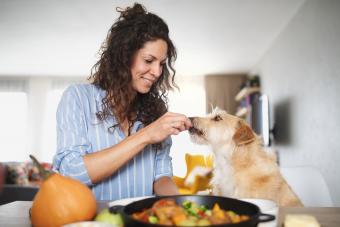
While pecans can be perceived as a healthy snack due to their benefits to humans, your dog should never be permitted to eat them. Pecans can be dangerous to your dog if consumed due to the toxins they contain.

Pecans Aren't Safe for Your Dog
Pecans contain a toxin known as juglone, which is harmful to both dogs and horses. They can lead to gastrointestinal distress, blockages within the intestines, and seizures.
Similar to walnuts, pecans are incredibly prone to mold development, which contains something called mycotoxins. Mycotoxins can cause seizures, tremors, or damage to your dog's neurological system. Aflatoxins, a specific type of mycotoxins, are also known to develop on pecans.
What to Do if Your Dog Ate Pecans
If you drop a pecan or two on the floor, that's generally not something to worry about, although you should still observe your dog's behavior and wellness.
If your dog ingests pecans in large amounts, or perhaps ingested one that contained the mold with aflatoxins or mycotoxins, the first symptoms often involve vomiting or diarrhea, or both. These symptoms sometimes only last several hours, but in moderate to severe cases, symptoms can worsen over time. This can be fatal if left untreated.
It's better to be safe than sorry, so if your dog has consumed pecans, it's best to contact your veterinarian to let them know what happened. See what they advise. If they do advise close monitoring, they will already know the situation, which will put your dog at an advantage if symptoms present themselves.
Symptoms to Watch for
Most of the symptoms to watch for involve poisoning from aflatoxins. Symptoms to watch for include:
- Severe vomiting or diarrhea
- Lethargic behavior or weakness
- Rapid breathing or difficulty breathing
- Loss of appetite
- Yellowing eyes or gums (jaundice)
- Brown or reddish urine
- Blood in vomit or stool, which may be black
When to Go to the Vet
If your dog has consumed pecans, it's best to contact your vet as soon as you realize what happened. If you would rather wait, which is not advised, watch your dog closely for vomiting, diarrhea, or odd behavior.
If your dog begins to show symptoms, your veterinarian may first induce vomiting to attempt to remove toxins from your dog's system. It's important that you do not force your dog to vomit yourself unless otherwise instructed by your veterinarian.
Your veterinarian will probably order bloodwork and provide medication as needed. Due to the high sodium content in salted pecans, they can also cause severe dehydration, which is why your vet will likely hook them up to IV fluids.
Most dogs do make a full recovery after eating pecans, if they are treated. To avoid this situation, keep pecans out of your dog's reach.
Nuts in General Aren't Recommended
Pecans are no exception when it comes to fat content. Their high fat content can cause gastrointestinal problems such as diarrhea, as well as more serious illnesses, such as pancreatitis or gastroenteritis. Pecans from the store may also include additives that worsen the severity of the damage.

Nuts, such as pecans, are difficult to digest and are therefore not suggested for dogs. Small breeds are particularly prone to intestinal obstructions. If not handled promptly, blockages and other health complications can result in surgery or death.
If your dog does like nutty food, feeding xylitol-free peanut butter on occasion is recommended as an alternative.
Don't Share Your Pecans
If you're eating pecans, keep them to yourself. Pecans are toxic to your dogs and can not only cause obstructions, but may be toxic. If your dog has eaten pecans, contact the vet immediately and observe your dog for any signs of poisoning. Do your research and look for treats that are safe for your dog if you want to provide tasty additions to their diet.







